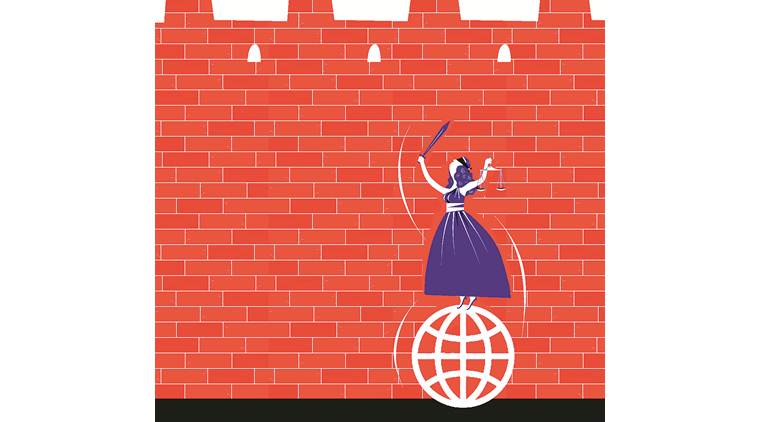- India
- International
Winning the legal argument, China has learnt from history of great power relations
The case for China’s culpability is based on the principles of state responsibility and Beijing’s alleged failure to respect the obligation, under the 2005 International Health Regulations, to notify the world on the outbreak of the epidemic.
 While outcomes in international conflicts tend to be defined by power, the international discourse on any conflict today is framed in legal terms.(Illustration by C R Sasikumar)
While outcomes in international conflicts tend to be defined by power, the international discourse on any conflict today is framed in legal terms.(Illustration by C R Sasikumar)
As the worldwide death toll from Covid-19 pandemic mounts — by the weekend it had crossed 33,000 — an important argument is unfolding about China’s responsibility for wreaking the havoc. Lawyers and activists have begun to sue China in US courts demanding compensation. Politicians are not far behind.
A resolution has been moved in the US Senate calling on the international community to inquire into the origins of the virus in China’s Wuhan province, quantify the damage inflicted on the rest of the world, and design a mechanism of reparations from Beijing.
The case for China’s culpability is based on the principles of state responsibility and Beijing’s alleged failure to respect the obligation, under the 2005 International Health Regulations, to notify the world on the outbreak of the epidemic. Many international jurists dismiss these claims by citing the principles of sovereign state immunity, the lack of precedent in holding states to account for the spread of infectious disease beyond their borders and the absence of provisions for reparations under the IHR.
On the face of it, China is too much of a Gulliver to be tied down by legal Lilliputs. Yet, before we dismiss international law as not real law, “legalpolitik” can put some real pressure on big nations and contribute to the power play among them. As public opinion began to intrude into diplomacy over the last two centuries, legality and moralpolitik have become an integral part of geopolitics.
Most world leaders know, whether they say it aloud or not, the international costs of the pandemic could have been far lesser if China had acknowledged the spread of the virus from Wuhan early on and informed other countries.

It is one thing to know but entirely another to prove it under the law. Most governments believe the pursuit of claims against Beijing is a waste of time. If Beijing can make the World Health Organisation toe its line and prevent the rest of the world, including US President Donald Trump, from describing COVID-19 as the “China Virus”, it is unlikely to be impressed by a few legal impresarios from the West.
After all, China had dismissed the unanimous verdict of the Permanent Court of Arbitration (PCA) in 2016 on Beijing’s territorial claims over the South China Sea. Beijing did not even bother to appear in the case filed by the Philippines. China had simply declared that the PCA has no jurisdiction in the matter.
Despite winning the case on all counts at the PCA, the government of the Philippines under President Rodrigo Duterte chose to forget the judgment and seek political accommodation with Beijing. Manila’s choice boosts the belief that when power meets law, it is usually the former that prevails.
That power tends to prevail over law is certainly truer in international relations than domestic politics. In the domestic domain, the state as the highest authority compels citizens to abide by the law, with force if necessary. In the international arena, no single actor has the monopoly over the instruments of force. We have multiple sovereigns but no “world government” that can compel deviant states to conform to rules.
In theory, the members of the UN Security Council can authorise coercion — in the form of economic sanctions or military force. This, in turn, involves building a consensus among major powers, including the five permanent members of the UNSC who wield a veto. In reality, then, the UNSC can’t act against one of the five permanent members.
Beijing, which was so eager to get the UNSC to discuss the situation in Jammu and Kashmir since last August, has simply blocked all suggestions for a discussion on the corona crisis in recent days.
Does that mean might is always right? Are laws meaningless in the global arena?
While outcomes in international conflicts tend to be defined by power, the international discourse on any conflict today is framed in legal terms. Whether it is a conversation between a state and its citizen or among governments or in a country’s outreach to the global society, legal narratives have a weight all of their own. Delhi, for example, has struggled in recent days to counter the global interpretation of its domestic actions.
Winning the legal argument, China has learnt from the history of great power relations, is very much part of great power jousting. The negative lessons are from the Soviet Union that dismissed the Western legal arguments during the Cold War as based on the logic of capital and empire. That did not convert many beyond the choir.
The positive lessons are from Great Britain and the United States. The enduring Anglo-Saxon hegemony is rooted not just in economic and military power. It has always been underwritten by a powerful legal tradition that shapes the global narrative on most issues.
As it mounts a massive propaganda offensive against the US on the corona crisis, China’s state lawyers have filed a case in the Wuhan Intermediate People’s Court last week accusing various US government agencies of covering up the origin of the coronavirus. It is no longer about China defending against a powerful international narrative; it is developing one of its own.
Over the last few years, China has learnt to deploy international law in pursuit of its larger global goals. It has trained armies of international lawyers who argue from the first principles of jurisprudence, inject Chinese political conceptions like the “Belt and Road” into multilateral agreements and push for new international norms to suit Beijing’s interests.
India has been at the receiving end of China’s legalpolitik — most recently on the quest for the membership of the Nuclear Suppliers Group and the constitutional changes in Kashmir. Delhi could learn a trick or two from Beijing on how to make international law the keystone of India’s diplomacy, especially in the multilateral domain.
If China could emulate US and Britain on leveraging legalpolitik for strategic ends, India should not find it too hard to reinvest in the geo-legal arts that Delhi inherited from the Anglo-Saxons but seems to have lost along the way.
This article first appeared in the print edition on March 31, 2020 under the title ‘The art of China’s legalpolitik’. The writer is director, Institute of South Asian Studies, National University of Singapore and contributing editor on international affairs for The Indian Express
40 Years Ago
EXPRESS OPINION
More Explained
Apr 18: Latest News
- 01
- 02
- 03
- 04
- 05









































